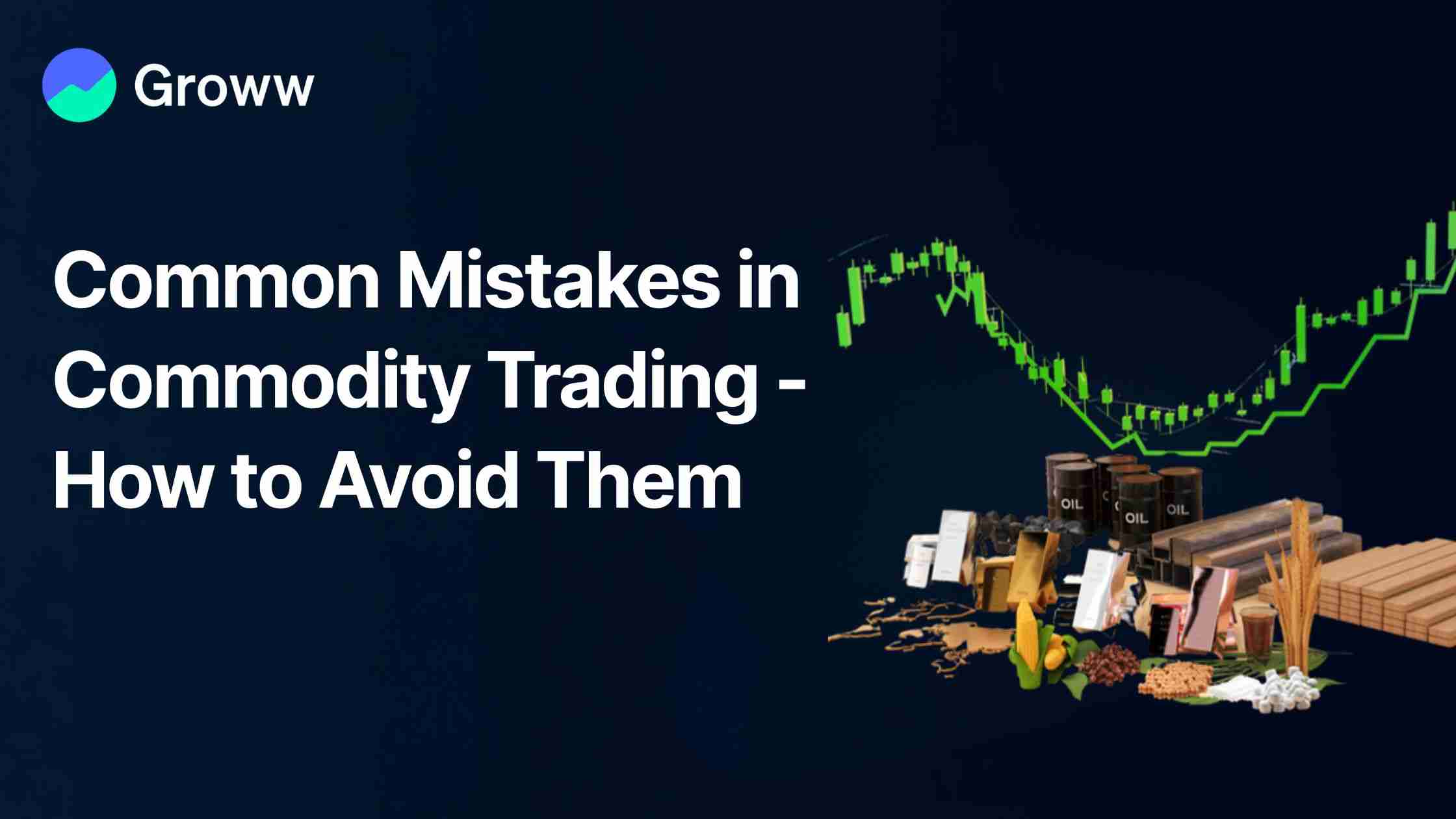Common Mistakes in Commodity Trading - How to Avoid Them

Commodity trading refers to the buying and selling of raw materials and primary products, usually through futures contracts on exchanges such as the MCX and NCDEX, among others. Metals such as gold and silver, agricultural products such as wheat and soybean, oil and natural gas are some of the commonly traded commodities on the exchange.
To avoid any major mistakes in commodity trading, it is important to have a thorough understanding of the market and a well-defined trading plan. Some of the common mistakes that traders make include failing to set capital limits, entry and exit strategies, stop/loss orders and ignoring proper risk management.
Let’s explore the same in detail and how to avoid them.
Common Mistakes in Commodity Trading
Going against the market trend
One of the common mistakes that new traders make is attempting to predict market reversals or trading against the current market trend. As a result, this can lead to loss. Therefore, it is always important to follow the trend unless there is any sign of reversal.
Use of basic trend indicators such as moving averages, price patterns, and volume indicators can help in identifying the trend. Trend confirmation can be further enhanced with tools such as Relative Strength Index (RSI) or MACD.
Not managing stop-loss orders
A stop-loss is a predefined exit point for a trade that helps traders to limit any potential losses. However, many beginners often tend to ignore to set a stoploss, and manually monitor the trade. This could eventually lead to larger-than-expected loss if the market moves rapidly against them.
In such such cases, one can make use of the automated stop-loss orders available on trading platforms for better discipline
Overlooking position sizing
Buying and selling huge volumes of lots without knowing position size or account exposure may lead to huge losses in case of an unfavorable movement in the market. It is important to calculate the trade size based on your capital.
Here, the best way to go about would be to ensure that your position sizing is based on 1-2% of your capital per trade.
Overtrading
Overtrading is often driven by emotions such as FOMO or revenge trading. Many traders often make a mistake by entering multiple trades in a day, hoping one of these trades can be profitable. Trading excessively or too frequently may lead to higher transaction costs and risks, particularly if you enter a large number of trades without a strategy.
Hence, it is important to stick to a trading strategy and not do multiple trades in a single day to make up for the losses.
Innoring trading timings
There are specific trading hours for each commodity that varies based on the exchange and the commodity itself. Knowing these timings allows traders to easily enter or exit from trades during price movements and market volatility.
For example, for better execution, many traders choose to trade during the high-liquidity periods such as at the US market opening time in the case of crude oil.
Ignoring risk management
Trading in the commodity markets can be volatile as it is highly influenced by factors like supply, demand, and geopolitical events. It exposes traders to sudden price fluctuations. Therefore, it is very important to use risk management strategies such as hedging, stop-loss orders, avoiding overleveraging, etc.
This helps to mitigate the risks associated with commodity trading. You can also consider portfolio diversification and maintaining favourable risk-to-reward ratio.
Not understanding expiry and rollovers
Every future contract in commodity comes with an expiry date, and it is very important to keep a track of these expiry dates to avoid auto square-off of your positions. Many traders often fail to keep track of contract expiry dates, which can also incur in rollover charges too.
Rollover is typically not automatic on all platforms. Hence, you can consider manually reviewing the rollover deadline to avoid any forced exits.
Ignoring contract specifications
Many traders tend to ignore the commodity contract specifications, which can lead to significant losses. Before entering into commodity trading, it is essential to know the specific details about each commodity contract, like margin requirements, lot size, delivery terms, and costs involved.
Make it a habit to refer to exchange-issued product notes for detailed contract specifications.
Emotional trading
Making impulsive decisions in trading based on emotions can succumb you to higher risks. It leads to irrational decision making due to fear, greed, or panic.
To avoid such mistakes, one should do a thorough analysis and use a logical approach to trading. You can also start using a trading journal or checklist to stya objective and track decisions.
Holding positions overnight without planning
Traders often tend to carry their positions overnight without analysing the risk involved. Overnight trades are subject to global events, potential gap risks, and low liquidity (especially in commodities that are influenced by international markets).
One should only hold overnight positions if they have considered the risk and made the necessary stop loss adjustments. Also, factor in potential changes in overnight margin requirements.